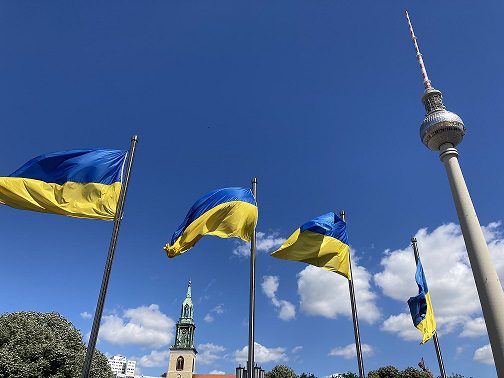
Blue and Yellow

June 13, 2022
I have just returned from traveling through Central and Eastern Europe on the excellent train network present in every country we visited. The trip was a powerful reminder of how that part of the world suffered terribly under successive totalitarian regimes – first the Nazis and then the Soviets. There is a more recent common bond – support for Ukraine.
Everywhere blue and yellow was the theme, from the flying of flags on public buildings to the recent addition of paint to Soviet war memorial. The support is not just symbolic. There were pop up help stations for Ukrainian refugees in railway stations and other public places, and collections were being held routinely to garner financial assistance.
Our travels brought us into direct contact with Ukrainian people. Our first night included a conversation with two women on a neighboring table, one Russian and one Ukrainian, but both resolutely opposed to the current Russian aggression. We shared a railway carriage with four Ukrainian women who were seeking to travel home, believing that their part of the country would now be safe. A Ukrainian-born, naturalized US citizen helped us with the bureaucracy of booking Polish train tickets. In doing so, he casually explained that his hometown had ‘only’ been bombed once. He had spoken to his cousin earlier that morning, who was serving in the Donbas and reported that his unit had just received its ‘good morning call’ from the Russian artillery. In Berlin we met a student who was being provided free tuition by the Germans to complete her studies. She needed time to develop some trust with us before explaining that she was from Kharkiv. I doubt she will be returning home soon.
As we walked around various cities, we saw time and time again evidence of the deep scars inflicted by the brutality of the occupiers during the fifty or so years through the early 1990s. There are few people left who remember the terror of the Nazis, but there are many who can recall the presence of Soviet soldiers and tanks. Poland, in particular, seems to be in no mood to allow a return to domination by its overbearing neighbor located five hundred miles to the east. The attitude of these people is probably harder for us to understand, given there is so little to remind us of the effects of totalitarian regimes. Maybe that is why our foreign affairs experts so grossly underestimated the will of the Ukrainian people to resist the Russian invasion. In that stance the Ukrainians are not alone. Putin’s desire to restore Russian glory will continue to meet fierce resistance no matter the effectiveness of his artillery.
But what of coronavirus in this area so caught up in the harsh realities of war? The further east we traveled, the fewer the signs of the pandemic we saw. Naively we asked a hotel desk clerk in Bratislava whether we needed to wear masks. Her succinct non-CDC approved response was simple: “Covid left.”
Richard Rushton



